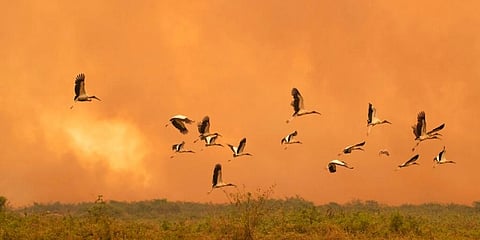

NEW DELHI: The new review State of the World’s Birds, found that approximately 48 percent of existing bird species worldwide are known or suspected to be undergoing population declines. This is compared to trends in 39 percent of species remaining stable, just 6 percent showing increasing population trends, and 7 percent still unknown.
Global bird populations have steadily declined over the last three decades, says new research. The continued growth of the human footprint on the natural world – which has led to the degradation and loss of natural habitats as well as direct overexploitation of many species – are the key threats to avian biodiversity, says research published on May 5, 2022, in the Annual Review of Environment and Resources.
Climate change is also identified as an emerging driver of bird population declines in the study, led by Manchester Metropolitan University. Results of the State of India’s Birds (SoIB) report released by a partnership of 10 Government and non-Governmental organizations in February 2020 directly fed into this global assessment.
This pattern of varying responses by migratory guilds has also been observed in Europe, North America, and India, where climate change is considered to be a major driver of change.
Dr Alexander Lees, Senior Lecturer at Manchester Metropolitan University, and lead author of the study said: “Avian diversity peaks globally in the tropics and it is there that we also find the highest richness of threatened species. We know a lot less about the fortunes of tropical bird species than we do about temperate ones, but we are now witnessing the first signs of a new wave of extinctions of continentally-distributed bird species which has followed the historic loss of species on islands like the Dodo”.
The study, which involved scientists from Manchester Metropolitan, Cornell University, Birdlife International, the University of Johannesburg, Pontifical Xavierian University and Nature Conservation Foundation, India, reviewed changes in avian biodiversity using data from the International Union for Conservation of Nature’s Red List to reveal the changes in fortunes of the globe’s 11,000 bird species.
ALSO READ | Spot the species
Results of the SoIB report directly fed into this global assessment. Long-term trends were estimated with sufficient confidence for 146 species in India, of which nearly 80 percent were found to be declining (50 percent of these declining strongly), while just over 6 percent had stable population trajectories, and 14 percent of species exhibited increasing population trends.
Alongside tropical forests, natural grasslands emerge as a habitat that is particularly threatened, with strong declines in grassland birds observed in North America, Europe, and India.
Dr Ashwin Viswanathan, a researcher at the Nature Conservation Foundation, India said “If unique ecosystems like grasslands are to retain their diverse birdlife into the future, both Governments and research groups must prioritize such landscapes and their inhabitants for conservation and ensure that they do not become plantations or woodlands.”